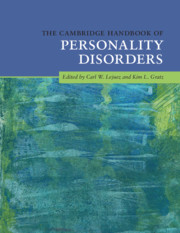Book contents
- The Cambridge Handbook of Personality Disorders
- The Cambridge Handbook of Personality Disorders
- Copyright page
- Contents
- Figures
- Tables
- Contributors
- Preface
- Part I Etiology
- Part II Models
- 5 Controversies in the Classification and Diagnosis of Personality Disorders
- 5a Three Unresolved Conceptual Issues in Personality Disorders: Commentary on Controversies in the Classification and Diagnosis of Personality Disorders
- 5b Classification of Complex Disorders Is a Challenge Solved by Simplicity: Commentary on Controversies in the Classification and Diagnosis of Personality Disorders
- 5c Final Thoughts: Author Rejoinder to Commentaries on Controversies in the Classification and Diagnosis of Personality Disorders
- 6 Categorical Models of Personality Disorders
- 6a Good Taxonomy Can Address Classification Challenges in Personality Pathology by Providing Informative Priors That Balance Information Compression and Fidelity: Commentary on Categorical Models of Personality Disorders
- 6b A Hierarchical, Dimensional Approach Can Advance Personality Disorder Research: Commentary on Categorical Models of Personality Disorders
- 6c The Search for Clinically Meaningful Dimensions Requires a Clinical Theory: Author Rejoinder to Commentaries on Categorical Models of Personality Disorders
- 7 The Five-Factor Model of Personality Disorders
- 7a Personality Disorders are Disorders of Personality: Commentary on the Five-Factor Model of Personality Disorders
- 7b Assessment and Operationalization of Personality Disorders from a Five-Factor Model Perspective: Commentary on the Five-Factor Model of Personality Disorders
- 7c Challenges but Optimism Regarding the Adoption of Trait Models of Personality Disorders: Author Rejoinder to Commentaries on the Five-Factor Model of Personality Disorders
- 8 Interpersonal Models of Personality Pathology
- 8a Interpersonal Nuance in Context: Commentary on Interpersonal Models of Personality Pathology
- 8b Contextual Dynamics in the Interpersonal Theory of Personality and Personality Disorder: Commentary on Interpersonal Models of Personality Pathology
- 8c Expanding on Interpersonal Models of Personality Pathology: Author Rejoinder to Commentaries on Interpersonal Models of Personality Pathology
- Part III Individual Disorders and Clusters
- Part IV Assessment
- Part V Treatment
- Index
- References
8 - Interpersonal Models of Personality Pathology
from Part II - Models
Published online by Cambridge University Press: 24 February 2020
- The Cambridge Handbook of Personality Disorders
- The Cambridge Handbook of Personality Disorders
- Copyright page
- Contents
- Figures
- Tables
- Contributors
- Preface
- Part I Etiology
- Part II Models
- 5 Controversies in the Classification and Diagnosis of Personality Disorders
- 5a Three Unresolved Conceptual Issues in Personality Disorders: Commentary on Controversies in the Classification and Diagnosis of Personality Disorders
- 5b Classification of Complex Disorders Is a Challenge Solved by Simplicity: Commentary on Controversies in the Classification and Diagnosis of Personality Disorders
- 5c Final Thoughts: Author Rejoinder to Commentaries on Controversies in the Classification and Diagnosis of Personality Disorders
- 6 Categorical Models of Personality Disorders
- 6a Good Taxonomy Can Address Classification Challenges in Personality Pathology by Providing Informative Priors That Balance Information Compression and Fidelity: Commentary on Categorical Models of Personality Disorders
- 6b A Hierarchical, Dimensional Approach Can Advance Personality Disorder Research: Commentary on Categorical Models of Personality Disorders
- 6c The Search for Clinically Meaningful Dimensions Requires a Clinical Theory: Author Rejoinder to Commentaries on Categorical Models of Personality Disorders
- 7 The Five-Factor Model of Personality Disorders
- 7a Personality Disorders are Disorders of Personality: Commentary on the Five-Factor Model of Personality Disorders
- 7b Assessment and Operationalization of Personality Disorders from a Five-Factor Model Perspective: Commentary on the Five-Factor Model of Personality Disorders
- 7c Challenges but Optimism Regarding the Adoption of Trait Models of Personality Disorders: Author Rejoinder to Commentaries on the Five-Factor Model of Personality Disorders
- 8 Interpersonal Models of Personality Pathology
- 8a Interpersonal Nuance in Context: Commentary on Interpersonal Models of Personality Pathology
- 8b Contextual Dynamics in the Interpersonal Theory of Personality and Personality Disorder: Commentary on Interpersonal Models of Personality Pathology
- 8c Expanding on Interpersonal Models of Personality Pathology: Author Rejoinder to Commentaries on Interpersonal Models of Personality Pathology
- Part III Individual Disorders and Clusters
- Part IV Assessment
- Part V Treatment
- Index
- References
Summary
This chapter reviews how personality disorder assessment, conceptualization, and treatment can be enhanced by considering interpersonal models. Contemporary Integrative Interpersonal Theory (CIIT) provides conceptual grounding to interpersonal models, which are often constructed around the two dimensions of agency and communion. Agency captures the theme of achievement, status, control, and differentiation, whereas communion captures the theme of connectedness, union, solidarity, and friendship. The authors discuss how personality disorder patients often struggle with agency and communion, and review research articulating how personality disorders are associated with specific impairments in agency and communion in cross-sectional and longitudinal research designs. They also propose a fifth assumption to CIIT to integrate emerging literature on pathological interpersonal patterns in personality disorders. This assumption emphasizes the importance of context in characterizing non-normative social exchanges beyond simple deviations from complementarity. They conclude by discussing how concepts in interpersonal models can be used to inform and implement therapy for patients with a personality disorder.
Keywords
- Type
- Chapter
- Information
- The Cambridge Handbook of Personality Disorders , pp. 171 - 184Publisher: Cambridge University PressPrint publication year: 2020
References
- 1
- Cited by

